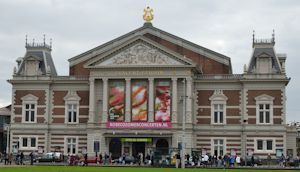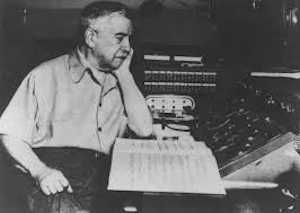 My wife and I were recently in Amsterdam revisiting the major art museums and enjoying that wonderful freedom which makes this city so extraordinary. The weather had been really hot, which I don't associate with Holland at all, and on this particular day the heat had joined forces with a great tumult of humidity. Storm clouds rolled in, just as we started our lunch at a typically Dutch restaurant very close to the Concertgebouw. Assessing the downpour, we made lunch a leisurely affair but even after at least two espressos, the rain continued and we needed to get back to our apartment. The restaurant was helpful and rang for a taxi, which then took simply ages to appear -- probably understandable in the circumstances. But the rain was incessant.
My wife and I were recently in Amsterdam revisiting the major art museums and enjoying that wonderful freedom which makes this city so extraordinary. The weather had been really hot, which I don't associate with Holland at all, and on this particular day the heat had joined forces with a great tumult of humidity. Storm clouds rolled in, just as we started our lunch at a typically Dutch restaurant very close to the Concertgebouw. Assessing the downpour, we made lunch a leisurely affair but even after at least two espressos, the rain continued and we needed to get back to our apartment. The restaurant was helpful and rang for a taxi, which then took simply ages to appear -- probably understandable in the circumstances. But the rain was incessant.
 Finally the taxi arrived across the street -- just as the worst of the storm erupted. We ran to the car and threw ourselves into the back seat, very wet from the deluge. We gave our driver the apartment address near the Vongel Park and set off, steam lightly rising from our soaking clothes. But despite our discomfort we very quickly noticed that there was some very interesting music playing on the taxi's sound system. In silence we listened trying to identify the work. It was the beginning of the last movement of Beethoven's Piano Sonata Opus 109, one of the composer's strangest and most beautiful creations and written just seven years before his death in 1827. I looked at the driver, who was very Dutch, large in frame and in his 60s. His eyes were quite intense and he had a very no nonsense air about him. I surmised that he must have turned on the radio and that this music was therefore a random choice. How wrong I was!
Finally the taxi arrived across the street -- just as the worst of the storm erupted. We ran to the car and threw ourselves into the back seat, very wet from the deluge. We gave our driver the apartment address near the Vongel Park and set off, steam lightly rising from our soaking clothes. But despite our discomfort we very quickly noticed that there was some very interesting music playing on the taxi's sound system. In silence we listened trying to identify the work. It was the beginning of the last movement of Beethoven's Piano Sonata Opus 109, one of the composer's strangest and most beautiful creations and written just seven years before his death in 1827. I looked at the driver, who was very Dutch, large in frame and in his 60s. His eyes were quite intense and he had a very no nonsense air about him. I surmised that he must have turned on the radio and that this music was therefore a random choice. How wrong I was!
As we listened we became aware that this was no ordinary performance. Something really amazing was happening. The close, boxy, intimate sound revealed that it was an old recording from another era, but the performance was totally and completely compelling. It captured your imagination and presented the most exquisite storytelling. But who was the pianist?
 "This is Opus 109 but can you tell me who is playing please?" My question seemed an act of futility, given my instant and uncomplimentary assessment of the driver. So I didn't expect the response I received. It was like a Federer forehand to the base of the court hit with enormous ferocity.
"This is Opus 109 but can you tell me who is playing please?" My question seemed an act of futility, given my instant and uncomplimentary assessment of the driver. So I didn't expect the response I received. It was like a Federer forehand to the base of the court hit with enormous ferocity.
Arthur Schnabel recorded in 1934. He was the first to record all the sonatas of Beethoven." The reply zinged past my feeble backhand attempt at trying to be knowledgeable. And then there was no more talking and our silence was filled only by the music.
 Schnabel was indeed the preeminent Beethoven pianist of the first half of the 20th century. He worked with the greatest conductors and orchestras across the globe including Furtwangler and Walter and with renowned instrumentalists such as Piatigorsky and Casals. His performances and recordings are legendary but perhaps little known to a wider audience these days.
Schnabel was indeed the preeminent Beethoven pianist of the first half of the 20th century. He worked with the greatest conductors and orchestras across the globe including Furtwangler and Walter and with renowned instrumentalists such as Piatigorsky and Casals. His performances and recordings are legendary but perhaps little known to a wider audience these days.
 The Sonata continued its journey and we arrived at our apartment where the driver turned off the engine and the meter and we sat with him in the taxi silently listening to the last movement where the music take us through extraordinary variations, from Chopin-like lyricism, to rough contrapuntal utterances, and then to that final rolling, thunderous dissonance with its chains of trills that leads inexorably back to that so simple melody which was the genesis of the whole 14 or so minutes of this movement.
The Sonata continued its journey and we arrived at our apartment where the driver turned off the engine and the meter and we sat with him in the taxi silently listening to the last movement where the music take us through extraordinary variations, from Chopin-like lyricism, to rough contrapuntal utterances, and then to that final rolling, thunderous dissonance with its chains of trills that leads inexorably back to that so simple melody which was the genesis of the whole 14 or so minutes of this movement.
Time at this point no longer existed. It was just the sound of this music filling the whole universe. The world felt strong, resolved, consonant and utterly beautiful. Without speaking I handed the fare to the driver who nodded. I then opened the door of the cab and we walked in the rain, which also now seemed a kind of benediction, to the front door of the apartment.
For a brief time everything seemed possible and life was limitless.